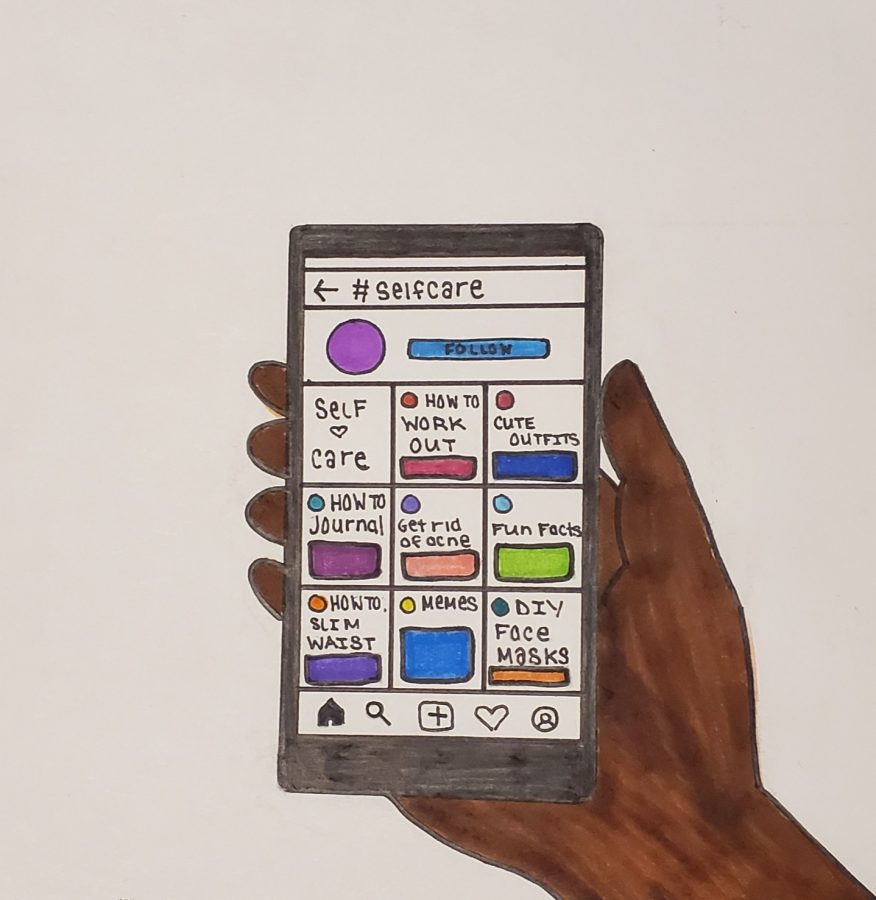OPINION: Instagram self-care accounts should live up to their name
Self-care accounts often use the hashtag to gain likes and followers.
After a stressful week of tests and quizzes, students may need to take some time for themselves. It is important for people to incorporate self-care habits to aid their health, mindset and well-being. Unfortunately, Instagram accounts have turned the term “self-care” into a hashtag as a way to be trendy or gain likes and followers.
Upon typing “self-care” into the hashtag search on Instagram, one will find over 12.1 million posts that may or may not be on-topic. Some posts will have an inspirational quote to try and help viewers get through the day, while others are captioned “Cute Casual Outfits” or “How to Prevent Acne.” Some are completely unrelated, like “Facts That Will Blow Your Mind.”
The problem with posts such as the aforementioned is that they abuse the meaning of self-care, giving viewers the wrong idea of what it represents: taking time to prioritize one’s well-being. Many accounts are constantly promoting brands, stores or products, leading people to believe that they need to spend money or buy from certain brands to practice self-care. People do not need to spend excessive amounts of money to take care of themselves.
Many posts show skin care or fitness tips that claim to work and show amazing results, though some of these can be very dangerous or damaging if exposed to the wrong audience. One post captioned “How to get a slim waist” by user @rainbosew explains how viewers can practice “self-care” through weight loss.
Having a “slim waist” is not necessarily self-care – all bodies are different. The post mostly body-shames and attacks self-image. The instructions are also potentially harmful. One of the tips is to eat smaller, more frequent meals. Although this may work, without some sort of disclaimer about healthy weight loss, viewers could take the tip too far, potentially harming their health.
Many accounts sharing similar tips cannot always be trusted.
One of the main priorities for self-care accounts is aesthetics and engagement. Several pictures appear on multiple, varying accounts because they are pleasing to the eye, leading people to like, comment or repost, which helps that specific account to land on the explore page.
Though many accounts may not be legitimate, there are still some hidden gems. Instagram accounts such as @theblissfulmind and @alex_elle inspire those seeking self-care, whether it’s posting an inspirational quote with a thoughtful caption or sharing tips to help spark new healthy rituals. One post from @theblissfulmind describes the different subcategories of self-care, mentioning tending to one’s mental, emotional and physical needs is more than baths and fancy products.
Other posts encourage new habits, like waking up early to be more productive, or starting a daily journal. These accounts remain transparent about their tips and the idea that self-care is not just another hashtag or trend. These creators seem to care about their followers’ well-being rather than the social media success.
Practicing healthy habits for one’s benefit can help improve mental health. Some self-care accounts, however, manipulate people’s perception of what self-care should look like. They give vulnerable viewers the idea that caring for themselves is limited to what they wear, how they look or what products they use, leading some to practice the opposite of self-care, potentially harming their physical or mental state.


